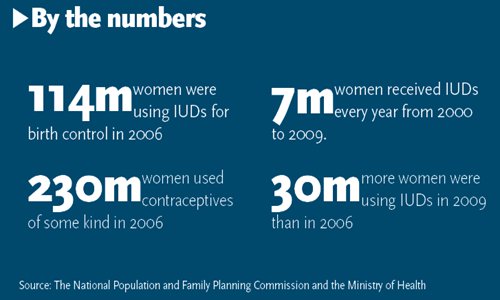
Women were coerced into installing intra-uterine devices across China starting from the 1980s as a family planning method. The devices can cause health issues in the long term. Many are enduring another painful process trying to have the device removed in order to have more children under the new policy.
"It was painful… and it was kind of like an abortion," Xiang Lan said, describing her surgery last year in which a doctor used forceps to remove the intra-uterine device (IUD) that had been in her uterus for more than 30 years.
Xiang was lucky compared with many other women who choose to have their IUDs removed after hitting menopause. Her operation went well and she went back to work after taking three days off.
But what 67-year-old Chang Suchun went through to get rid of her IUD was pure suffering. The device had become embedded into her uterus after being there for more than 25 years.
She writhed in pain as the doctor tried to pull it out. She could not tell how long the operation lasted and she passed out when the device finally came out, accompanied by gushing blood.
Statistics from the National Health and Family Planning Commission (NHFPC) showed that up to 2006, 114 million out of the 230 million Chinese women who used contraception chose the IUD.
The 2010 NHFPC yearbook revealed that 30 to 40 percent of contraceptive operations since 1983 were IUD surgeries. More than 7.81 million IUDs were implanted from 2000 to 2009.
According to a guideline released by the American Congress of Obstetricians and Gynecologists, IUDs are a safe, effective and reversible form of contraception.
But according to a NHFPC report on the effectiveness of IUDs in China based on 120,000 cases from 2000 to 2005, the accumulated defect rate reached 23.31 percent.
Zhu Chuzhu, an expert on demography wrote in her book on the influence of the family planning policy on women that some local governments were eager to accomplish "their mission related to the family planning policy, including contraception operations," and this is why China has a particularly high rate of IUD usage and related complication.
Internal affairs
Hai Qin (pseudonym), a woman living in Anhui Province who lost her only child, said that most mothers at her age, especially those living in suburban and rural areas, were asked to accept a IUD operation soon after they stop breastfeeding.
Thirteen female lawyers from Henan Province, Beijing and Shenzhen sent a joint letter to the NHFPC in December 2012, asking for an end to this practice, news portal ifeng.com reported.
By the time they started going through menopause years later, some of the women who had an IUD had actually forgotten about the device in their bodies.
"Women need to remove the IUD within six months after menopause begins. The uterus will gradually shrink after the menopause and IUD may cause pain or endometritis (inflammation of the uterus lining caused by an infection)," Wang Yu, an obstetrician and gynecologist from Shengjing Hospital of China Medical University in Shenyang, Northeast China's Liaoning Province, said.
Some IUDs contain copper, which can affect MRI scans on the waist and pelvis cavity, said Wang.
"There may be some complications during the operation to remove the IUD, including bleeding, pain, infections, perforation of uterus or the IUD breaking," said Wang, adding that most of these operations are safe.
Wang also mentioned that due to these complications, it is not unusual to see patients suffering from nausea, arrhythmia, chest pains or even fainting.
"The first IUDs used in the 1980s were rings made of stainless steel and they were abandoned as they were inefficient. Hospitals then began to introduce new types of IUDs which contain copper," Wang said.
Dr Kun Ka-yan, a private obstetric specialist in Hong Kong was quoted by the South China Morning Post as saying that the stainless steel IUDs needed follow-up checks to monitor any changes and the development of the body while the device is inside, but many people failed to have the checks which resulted in health problems.


















































